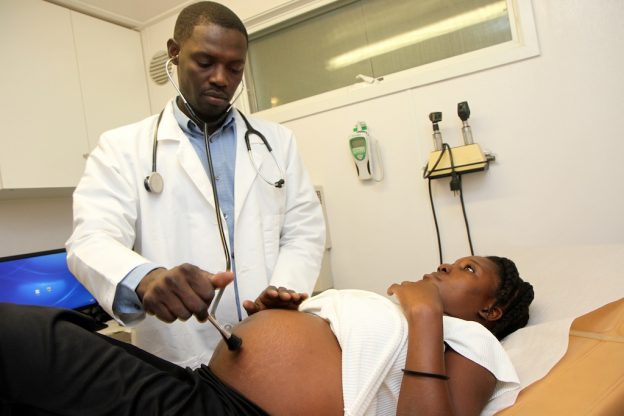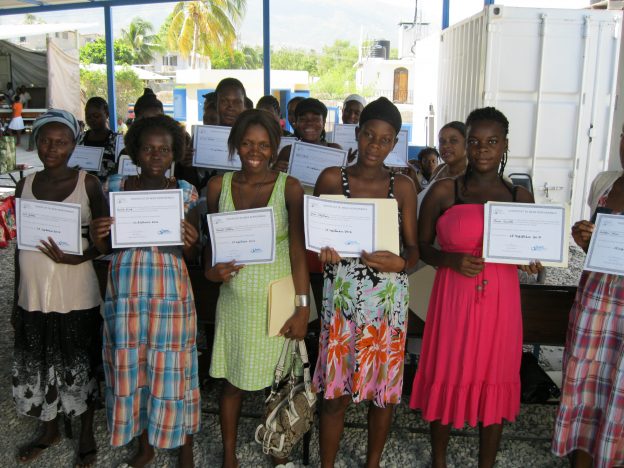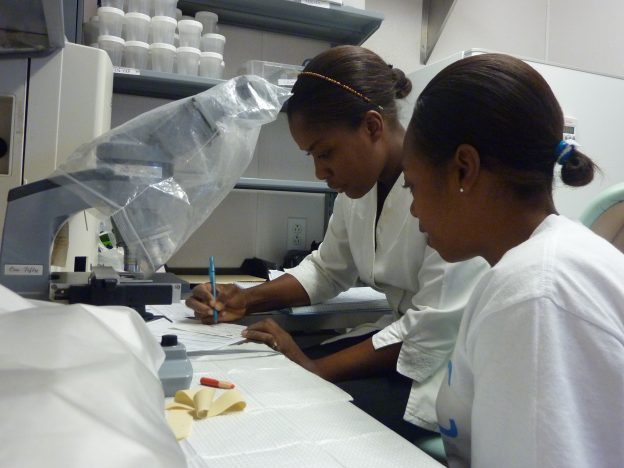At C2C’s clinic in Port-au-Prince, Haiti, 35 pregnant women were awarded a “Certificate of Responsible Motherhood”, recognizing their attendance at the WHO-recommended minimum of four antenatal care visits. Despite the living conditions in central Port-au-Prince, these women are doing everything in their power to ensure the health of their unborn babies. C2C is humbled by and honored to support their efforts.
-
Stories from Haiti

On my recent trip to Port-au-Prince, I had the honor of collecting the narratives of 11 brave Haitian pregnant women and girls who were willing to tell me their personal stories. I asked them about their childhoods, their current living situations, what they did for food and water each day, how they became pregnant and their feelings about their pregnancies. These women opened up to me with astonishing courage given the daily struggle they face to keep themselves healthy, sheltered and safe.
Of the 11 women I interviewed, not one of them had planned their pregnancy. For hours, I sat across from girls, age 19 to 23, most of whom were students who had since dropped out of school due to their pregnancies, and watched them choke back tears of disappointment and fear. They won’t be going back to school. And without a trade, these girls will be forever caught in a cycle of poverty that continues to plague much of Haiti and the developing world. Nike calls it “The Girl Effect” and it was devastating to see their future independence and well-being shattered by an unwanted pregnancy and accompanying cost burden.
Two of the girls I spoke with still haunt me. “Marie” is 22 years old, 5 months pregnant, and comes to Port-au-Prince from the border area with the Dominican Republic to receive antenatal care at our clinic at Grace Children’s Hospital. Why does she come to Grace from Terre Roche which is over 3 hours, a motorcycle and tap-tap ride, away? Because Marie is HIV-positive and, due to the enormous social stigma HIV still carries in Haiti, she gets up at 5am on her appointment days to arrive at the clinic by 8am only to wait 2-3 hours to see the doctor and then turn around and return home. It takes her all day. She was in school, but now, due to her pregnancy, she relies completely on her “boyfriend,” a motorcycle taxi driver. Marie was given by her father at the age of nine as a gift to a man in Terre Roche and has worked, unpaid, for him ever since.
“Annette” is a 19-year old orphan whose parents died when she was young, most likely from tuberculosis. She is still living under a makeshift tent with a friend in Port-au-Prince, two and a half years after the 2010 earthquake. She is HIV-positive and refuses to tell anyone of her condition, even her two sisters who live in the Dominican Republic. Annette was raped by her boyfriend who, when she became pregnant, tried to force her to take an abortion pill. Annette refused and her boyfriend abandoned her. She is unable to stay in school due to her pregnancy and has no idea how she is going to support a child. She walks to the clinic for her appointments, an hour each way in the 95-degree Haitian sun at 8 months pregnant. She currently begs on the street for money to buy food and water. She is unable to stay on her anti-retroviral therapy as she does not always have food available to avoid the extreme nausea that comes with taking ARTs on an empty stomach. She is completely terrified and wept openly for the majority of our discussion. Yet she insisted on continuing the interview.
How can one not be humbled in the presence of such suffering and courage? What future do the young girls of Haiti have without information about safe sex, access to contraception and the empowerment to use it? When will there be a national public health education campaign about HIV to reduce the acute social stigma of the disease so that women like Marie and Annette are not forced into silent dungeons of isolation for fear of family and community members ostracizing them? Their circumstances are dire and the pubic systems that are supposed to support them are broken. But we cannot, nor shall we, turn our backs on these girls. Their determination to survive and to support their young children despite their bleak outlook requires our unconditional commitment to change their future and, that of their daughters, for the better.
*Photo courtesy of Nadia Todres
-
Photo of the Month
- Photo- Working in the lab at the Haiti clinic
Despite the challenges of occasional pharmacy stock-outs, diagnostic equipment failures, and staff shortages, Containers 2 Clinics continues to deliver quality antenatal care to the women and children in central Port-au-Prince. And word is getting out. On a recent trip, it became clear that women are coming from farther and farther outside Port-au-Prince because they have heard that they can receive reliably-comprehensive care from the C2C clinic at Grace Children’s Hospital. So they queue up at 6am in order to be at the front of the triage line when the hospital gates open at 8am. But for them it is worth it to know that they won’t have to go elsewhere for consultation, diagnostic testing or medications. In fact, they repeatedly ask if they can deliver their babies in the clinic.
-
Looking Ahead in Haiti
When I arrived on Monday, December 5th, it was my twelfth trip to Haiti. As C2C’s Director of Operations, I first came to Haiti just sixty days after the devastating January 2010 earthquake to work in partnership with AmeriCares to develop clinic sites in a country whose health system had reverted to chaos. C2C entered Haiti with one objective: to work in partnership with local institutions and to support their recovery efforts by providing focused, integrated maternal and child health services for Haiti’s most vulnerable people.
Douglas Hodgkins Photography In March 2010, the Port-au-Prince airport was still in disarray: one runway was functional and visitors and aid workers entered the country through a temporary warehouse which functioned as both immigration center and logistics ground-zero. I was reminded of that first trip on Monday when I was processed swiftly and efficiently through immigration. The customs official welcomed me warmly to Haiti and I was handed a tourism brochure. What a difference nearly two years can make.
These days, we travel to the C2C clinic and partner sites on roads that are reasonably cleared of rubble. Hundreds of thousands of people are still living in IDP camps; the traffic is still congested beyond description; and Haitian people still struggle to meet their basic needs. But things have changed – not fast enough, but for the better. The influx of relief and aid organizations has thinned and streamlined its collective efforts.
Tori Stuart Photography Despite hurricanes, cholera outbreaks, periods of civil unrest, and pharmaceutical shortages, the C2C clinic continues to do what it set out to do over a year ago: to provide women with high-quality health services. Over 9,000 women have been treated at the C2C clinic. Drs. Roche and Justin, physicians on-site daily at the C2C clinic, provide comprehensive pre-natal care to pregnant women. Our nurses triage patients upon arrival at the clinic and manage medical records, tracking the progress of each woman’s pregnancy. On average day at the C2C maternal health clinic, 40 women receive urgently needed care – a testament to our partner, Grace Children’s Hospital, whose staff has worked tirelessly to rebuild a 40-year old local health institution.
In 2012, C2C will integrate two programming additions to our service delivery: community health education and ultrasound technology. Health education services will focus on preventive care on important topics like: healthy pre-natal and post-natal practices, proper breastfeeding and infant care techniques, HIV/AIDS prevention education, and sanitation and hygiene. By introducing ultrasound technology, our pre-natal patients will be better served by identifying dangerous obstetric complications early and identifying solutions to ensure safe delivery.
C2C is working to grow its clinic presence in Haiti and to expand our ability to more reach women and children, to help keep families healthy, and to support local institutions to grow their capacity to serve patients in the year ahead.
Tori Stuart Photography -
Traveling to Port-au-Prince
Director of Operations Allison Howard and Program Director Kathleen Fleming are heading down to Port-au-Prince from March 14-19, 2010 to evaluate some sites and partnerships for the prototype container clinics.
They will be blogging from the field. Tune in!




